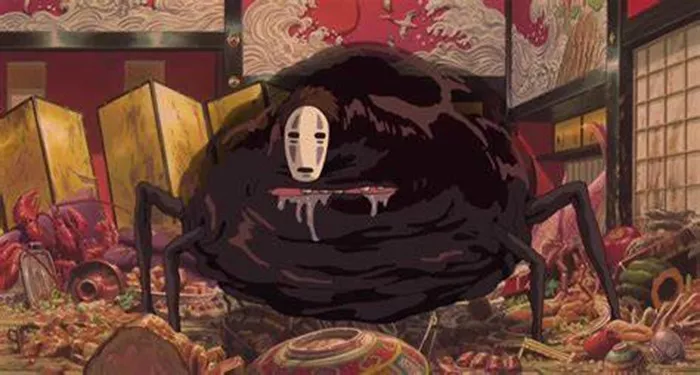No-Face, a mysterious and enigmatic character from the acclaimed animated film “Spirited Away” directed by Hayao Miyazaki, captivated audiences with his haunting presence and unpredictable behavior. Throughout the film, No-Face undergoes a transformation from a quiet and solitary figure to a chaotic and destructive force, leaving many viewers puzzled about the reasons behind his descent into madness. In this comprehensive article, we delve into the intricacies of “Spirited Away” to explore the factors that contributed to No-Face’s unraveling, examining themes of identity, desire, and the corrupting influence of power.
No-Face
Character Profile
No-Face, also known as Kaonashi in Japanese, is a spirit creature encountered by the film’s protagonist, Chihiro, during her journey through the spirit world. Initially depicted as a silent and mysterious figure wearing a white mask, No-Face is drawn to Chihiro’s kindness and innocence, leading him to follow her on her quest.
Transformation and Evolution
As the story unfolds, No-Face undergoes a transformation triggered by his interactions with the inhabitants of the spirit world, particularly Chihiro. His initially benign demeanor gives way to increasingly erratic and aggressive behavior, culminating in a destructive rampage within the bathhouse.
The Influence of Desire
Loneliness and Isolation
One of the key factors contributing to No-Face’s descent into madness is his profound sense of loneliness and isolation. As a spirit wandering the spirit world without purpose or companionship, No-Face is drawn to Chihiro’s kindness and hospitality, seeking a sense of belonging and connection.
Desire for Acceptance
No-Face’s desire for acceptance and belonging drives his actions throughout the film. He becomes enamored with Chihiro and the warmth of the bathhouse environment, seeking validation and approval from those around him. However, his misguided attempts to win favor lead to unintended consequences.
Corruption of the Bathhouse
As No-Face’s desire for acceptance grows, so too does his capacity for greed and consumption. He begins to exhibit a voracious appetite, consuming anything and anyone who offers him attention or material goods. His presence becomes increasingly disruptive, causing chaos and discord within the bathhouse.
Influence of External Factors
Negative Influences
No-Face’s descent into madness is also influenced by the negative forces and temptations present within the spirit world. Characters such as Yubaba, the powerful witch who oversees the bathhouse, exploit No-Face’s vulnerability and manipulate him for their own gain, exacerbating his feelings of confusion and alienation.
Absorption of Negative Emotions
No-Face’s transformation is further fueled by his ability to absorb the negative emotions and desires of those around him. As he becomes overwhelmed by the greed, envy, and selfishness of the bathhouse patrons, he internalizes these emotions, leading to a distorted perception of reality and a loss of self-control.
Themes of Identity and Self-Discovery
Identity Crisis
No-Face’s journey mirrors themes of identity and self-discovery explored throughout “Spirited Away.” His initial lack of identity and purpose reflects a sense of existential confusion and uncertainty, common to many of the film’s characters as they navigate the complexities of the spirit world.
Search for Purpose
As No-Face interacts with Chihiro and the other inhabitants of the spirit world, he grapples with questions of identity and purpose. His desire for acceptance and belonging drives him to adopt the behaviors and desires of those around him, ultimately leading to his downfall.
Redemption and Transformation
Despite his descent into madness, No-Face’s story ultimately concludes with a message of redemption and transformation. Through Chihiro’s kindness and compassion, he learns to confront his inner demons and embrace his true self, finding peace and contentment in his newfound sense of identity.
Interpretations and Symbolism
Symbolism of Consumption
No-Face’s insatiable appetite and tendency to consume everything in his path serve as a powerful metaphor for the corrosive nature of unchecked desire and greed. His transformation into a monstrous figure represents the destructive consequences of giving in to temptation and losing touch with one’s true self.
Reflection of Human Nature
No-Face’s journey resonates with audiences as a reflection of the human experience, highlighting the universal themes of loneliness, desire, and the search for identity. His struggles serve as a cautionary tale about the dangers of succumbing to negative influences and losing sight of one’s moral compass.
Cultural and Mythological Influences
No-Face’s character is deeply rooted in Japanese folklore and mythology, drawing inspiration from traditional spirits such as the tsukumogami—a type of sentient object that gains a soul after a hundred years of existence. His portrayal reflects themes of transformation and metamorphosis prevalent in Japanese storytelling.
Conclusion
The enigmatic character of No-Face in “Spirited Away” continues to intrigue and fascinate audiences with his haunting presence and complex journey. His descent into madness serves as a cautionary tale about the dangers of unchecked desire and the importance of staying true to oneself in the face of temptation.
As viewers revisit the world of “Spirited Away” and explore No-Face’s story, they are reminded of the universal themes and timeless messages embedded within Miyazaki’s masterful storytelling. No-Face’s journey serves as a poignant reminder of the power of empathy, compassion, and self-discovery in overcoming life’s challenges and finding inner peace.

